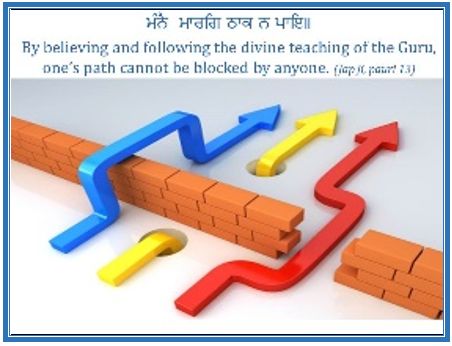
After Listening, What Next?
After suniai comes mannai. The pauris 12 to 15 of Jap Ji can be seen as an extension of the previous four. These are devoted to mannai, which literally means by believing and following. If suniai in pauris 8 to 11 emphasizes listening as the means, then mannai in the next four stanzas describes the fruits of having unwavering faith and belief in the Guru's instruction and practising it in daily life, a state that is the outcome of suniai, attentive listening.
The one, who sets on this path, progresses to a higher consciousness, beyond the confines of narrow sectarian consciousness. Intuitive awareness and understanding reveals the unity of all creation. Such a person ceases to act out of ignorance and egotism, and is freed from bondage.
In stanza 12 (manne kee gat kahee na jaai), Guru Nanak points out that the state of mind which is attuned to divine wisdom cannot be described completely. Any attempt will only lead to disappointment as such a feat is too difficult and too huge for anyone. There is neither the pen nor the scribe which could describe this spiritual state, nor is there sufficient paper to capture it (even if it were possible). Hence, the best the wise can do is to sit together and strive to contemplate and comprehend it.
The suggestion here is that this state, obtained through the practice of Gurbani's wisdom, awakens a deeper state of consciousness and awareness where ordinary tools of communication, such as language or speech, fall short.
The most beautiful things in the world can't be seen, nor touched, but are felt in the heart.
- Helen Keller, author and activist, the first deaf, blind and mute person to earn a Bachelor of Arts,
1880 - 1968
The stanza 13 (mannai surat hovai man budh) says, through the absorption and practice of the divine teaching of Gurbani in daily life, one's mind and intellect are imbued with divine consciousness. One's knowledge and understanding expands to an awareness of the whole of existence. One is not affected by worldly temptations and vices; one is freed from all fear and anxiety.
The take-away message here is that cultivation of Gurbani wisdom is the key and art of awakening the faculties that lie dormant in us. This bloom of spiritual wisdom takes away suffering and distress.
The stanza 14 (mannai maarag ?haak na paai) states, by acceptance or absorption of the words of Gurbani, roadblocks are removed. By remaining steadfast on the true path, one becomes firmly established in virtue (dharam) and lives and dies with dignity and honour.
This means that the one, who treads on this path, transcends narrow sectarianism and becomes established in divine virtues such as truth, justice and righteousness, etc., the foundational essence of religion.
The last stanza (mannai paavahi mokh duaar) explains, through emulation of the divine instruction of Gurbani, the door to freedom is made accessible. Freedom here implies the freedom from worldly bonds that tie us down. One who is thus freed also becomes an exemplar to family and friends, in other words, becomes a positive influence on others.
Such an individual does not go begging for a living or seeking spiritual guidance from anyone else anymore as he or she is now firmly grounded in the wisdom of the Divine. He or she earns an honest livelihood, an obvious reference to idlers disguised as holy people who go around begging and swindling in the name of religion.
The ending verses (aisaa naam niranjan hoi. je ko mann jaa?ai man koi), which follow all four stanzas from 12 -15 of Jap Ji, conclude that such is the blessing of the divine teaching of the Guru or the Name of the Divine, that one who pays heed, accepts, and imbibes it is purified.
One becomes immaculate, detached from the entanglements of worldly temptations and snares but only when one experiences spiritual awareness within one self and practises it externally and internally, in speech, words and deeds.
In summary, out of these four stanzas, number 12 describes the profound state of accepting and practising the divine teaching of the Guru, while stanzas 13-15 describe how such a devotee is transformed.
By accepting and emulating, one's consciousness and wisdom are awakened. One does not fall into the traps of any cult, creed or sect and meaningless rituals. Instead, one treads on the path of righteousness. One achieves self-realisation and liberation whilst living, and helps liberate others too.
Mannai signifies the experience or state that results from heeding and treading on the path. When we travel Guru-ward, we rebuild our fractured relationship with the ultimate Reality or Consciousness. This brings about a metamorphosis, an inner change that shifts our orientation.
Mannai signifies this culmination or shift in our inner consciousness, from acquired belief to authentic wisdom; from hearing to meaning and experience; from passive formalities to internalization and active absorption; from acting on handed-down cultural traditions to living by genuine wisdom.
I'd rather see a sermon than hear one any day; I'd rather one should walk with me than merely tell the way.
-Edgar Guest, poet, 1881-1959
Extracted from AWAT's recent issues on Jap Ji Sahib. Those who wish to receive the gems of Gurbani from AWAT can subscribe here: awordathought.com

Compiled and edited by
Ravin Kaur
Australia
---------------------------------------------
Related article:






